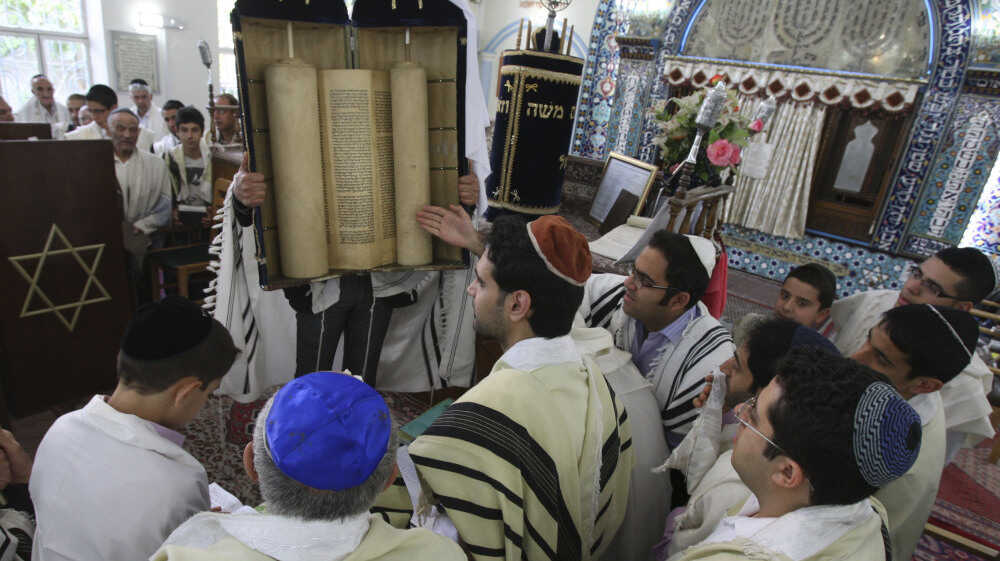- cross-posted to:
- judaism@hexbear.net
- cross-posted to:
- judaism@hexbear.net
(Mirror.)
Quoting Derek J. Penslar’s Jews and the Military: A History, page 208:
Of all the armies in which Jews took part, the Red Army had the greatest level of Jewish involvement and sacrifice. In keeping with the general patterns of mortality among combatants in the Soviet Union and the United States, over one‐third of Soviet Jewish soldiers perished during the war as opposed to only 1.5 percent of American‐Jewish soldiers. There were almost twice as many Jews in the United States as the Soviet Union, yet Jewish generals and admirals in the USSR outnumbered their American counterparts ten to one.49
In other ways, however, certain patterns of specialization and placement united Soviet and North American Jewish soldiers. As in earlier conflicts, so in World War II Jews were concentrated disproportionately in branches of service that required education and technical expertise. In the Red Army of the 1930s, the professor and major general G. Eierson had developed new theories of mobile warfare, and other Jewish officers had been prominent as inventors and developers of tanks and other armored vehicles.
Twelve of thirty Red Army armor specialists sent to Spain had been Jews. In 1939, the Spanish war hero Yakov Smushkevich was appointed commander of the Red Army’s air force, only to be liquidated by [Moscow] in 1941. During World War II, Jewish engineers developed the Red Army’s most successful tank and fighter aircraft. Three of the Red Army’s twenty most highly decorated submarine commanders during World War II were Jews.50
While these data are impressive in and of theirselves, Penslar did not specify the number of Jews in the Red Army. This is why I put Gabriel Mayer’s research in the URL. Quote:
It has been documented that 500,0003 Jews fought in the Red Army during WWII, and that the total numbers of Jews fighting in WWII amounted to approximately 1.7 million4 out of a worldwide population of less than 16 million, in other words, more than 10% of the worldwide Jewish population. Nevertheless, the earliest (and for a long time the only) recognition of Jewish participation in military operations was of Jewish GIs discussed in the American press.5
(Somebody might point out that there were approximately 600,000 Jews in the U.S. armed services, but keep in mind that ‘U.S. armed services’ is a broader category than ‘Red Army’.)
With the outbreak of WWII, the disproportionate representation of Jews in the Red Army increased even further, as did the ratio of promotions and decorations awarded to Jewish combatants. The following numbers illustrate the recruitment of Jews, as volunteers and conscripts, in large population centers:12 Moscow — 140,000 (population of 5 million); Leningrad — 130,000 (population of 3.2 million); Odessa — 55,000 (population of 604,000); Kiev — 35,000 (population of 846,000).
In certain military units, such as the Latvian Division, where Jewish soldiers constituted 30%, the numbers are even more disproportionate.13 The motivation of the Jews to fight was clearly fueled also by the news of the destruction of Jewry at the hands of the [Axis]. This circumstance did not escape the attention of the political leadership of the Red Army (GPUKA), which stated, “the most loyal elements in the Red Army during this difficult phase of the war were mostly Russians defending the homeland (“Mother Russia”) and Jewish soldiers.”14
The special motivation of the Jews prompted a suggestion to form Jewish fighting units. Thus, on February 12, 1943, Abram Margolis, the Commissar of the 32nd Infantry Division, called for the formation of a Jewish division, in light of the singularly horrific suffering that Jews were experiencing at the hands of the [Axis].15
Numbers alone do not tell the full story, however. During WWII, Jewish soldiers attained high ranks and received prestigious decorations. In Lithuania, the following Jewish generals participated in and commanded units during some of the most arduous phases of the war: General and Commander Izrail Borskin of the 65th Army, General Grigori Plaskov of the 2nd Armored Corps, and General Moise Kharkovsy of the 12th Artillery.
These generals and scores of other Jewish soldiers received “Order of Lenin” decorations.16 Altogether, during the 1940–1945 period, a total of 229 Jews were promoted to the rank of General or Admiral.17 The ranks of the decorated soldiers and officers were entirely out of proportion with the percentage of Jews in the population at large or even in the armed forces: in absolute terms, Jews accounted for the fourth largest number of highly decorated soldiers by nationality, following Russians, Ukrainians, and Belarusians, but naturally, out of a far smaller population.18
The highest military honor, “Hero of the Soviet Union,” was accorded to 154 Jews.19 A telling detail of this remarkable saga is that on January 31, 1943, at Stalingrad, General von Paulus, Commander of the German 6th Army, surrendered to Lt. Colonel Leonid Vinoukur, a Jew.20
As to be expected, the author could not resist mischaracterizing Moscow’s (admittedly rather harsh) anti‐Zionism as antisemitism, but most of this paper is still worth reading.
While the Jewish motive for joining the Allied forces is obvious, it may be less clear (unless they were pacifists) why other Jews would be reluctant to join them. We can derive a very plausible explanation for that by looking at how the Axis handled Jewish POWs. Quoting from Tom Bird’s American POWs of World War II: Forgotten Men Tell Their Stories, page 131:
Jewish POWs [whom] I interviewed were frightened throughout their imprisonment and were constantly aware of the possibility that they could be sent to a concentration camp.
These fears were a result of knowledge not only of what was happening to Jewish civilians, but also of what had happened to other POWs, notably Soviet Jewish prisoners. In 1941, Hitler issued the Commissar Order, which called for the elimination of political representatives and commissars, whom he considered the “driving forces of Bolshevism.” Included in the extermination order were all Soviet Jews. In July 1941, all Jewish POWs from the eastern front were ordered to be killed. No similar order was ever made concerning Jewish POWs from Britain, France, or the United States.
The reason may be that despite [Axis] propaganda that the Allies did not care about Jews, the [Axis] thought those nations would care very much if Jews from their armies became victims. A more likely explanation was that the [Axis was] concerned that [its] POWs would be mistreated if the Western nations learned that Jewish prisoners were being abused. But the apparent failure of the United States to investigate mistreatments of Jewish POWs implies that [Axis] propaganda was correct: The United States did not even care about its own Jews.
(Emphasis added in all cases.)
As a gentile, I, personally, can think of no choice for an Allied soldier more behooving than a Jew; their cause for joining is arguably the easiest of them all to understand. Nevertheless, when I think about it, they also had a good reason to be reluctant, because if the Axis had confirmation of their heritage then they could expect some especially harsh mistreatment during capture. With this in mind, I think that the Jews who fought in or alongside the Allies were especially brave.
For a biography related to this subject, see My War against the Nazis: A Jewish Soldier with the Red Army.
ETA: Soviet Jews in World War II: Fighting, Witnessing, Remembering.
100% bazado 😌👍🏼


